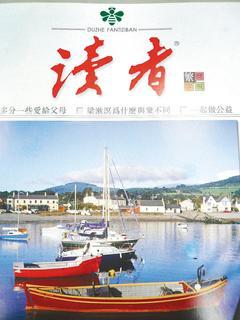First mainland magazine to hit Taiwan
|
|
The most widely circulated magazine on the Chinese mainland will soon be available across Taiwan, United Daily News, a Taiwan-based newspaper reported Thursday.
The general interest semimonthly magazine, Duzhe, was launched in Lanzhou, Gansu Province and has a circulation of about 5 million copies.
It's been compared to Reader's Digest and features articles, essays and excerpts from books.
It will become the first print media from the mainland to enter the island.
The authorities in Taiwan sanctioned the entry of Duzhe on Wednesday after a month-long review to ensure it won't promote communism, the Communist Party of China or a reunion with the mainland, according to the newspaper.
Fu Baozhu, director of the editorial committee at the twice monthly publication, told the Global Times that the magazine will be published in Taiwan within two months.
The Xinhua News Agency reported that it will be in traditional Chinese characters instead of the simplified ones common in the mainland.
Li Weiyi, spokesman of the State Council Taiwan Affairs Office, told the Global Times that it is part of ever-expanding cultural exchanges across the Straits.
"After the signing of the Economic Cooperation Framework Agreement, we are now promoting the signing of an agreement on cultural cooperation," Li told the Global Times.
Premier Wen Jiabao noted in the Government Report in March that the cross- Straits cultural and educational exchanges would be strengthened this year, enabling the public in both places to share the achievements of peaceful development.
Yu Guoming, vice-president of the School of Journalism at Renmin University of China, said authorities across the Straits should give more access to cultural products that can demonstrate a panoramic portrait of societies in both places.
After decades of isolation from the mainland and the pro-independence propaganda from the Democratic Progressive Party (DDP), which was in power from 2000 to 2008, many Taiwanese are wary of exchanges across the Straits.
Lin Kan-hsuang, a media worker in Taiwan, told the Global Times Thursday many young people who are between 20 and 30 consider the new economic cooperation and the arrival of mainland culture as an "intrusion" or a "threat."
Those views were echoed by Taiwanese Chu Li-an. "There used to be a belief that all mainland people in Taiwan were spies or PLA soldiers," he said.
"Though prejudice remains, the situation is improving and the acceptance level in Taiwan is improving," he added.
Chu said he expects the media across the Straits to play a stronger role in enhancing communication and dissolve misunderstandings.
In September 1987, two journalists from The Independence Evening Post arrived on the mainland as correspondents, breaking a deadlock. Now, China Times, a Taiwan-based newspaper, maintains a staff of 13 journalists on the mainland.
At least nine mainland media outlets have sent 26 journalists to Taiwan as of April.
The Taiwan authorities also changed the regulation last year allowing reporters to conduct interviews anywhere except in restricted areas, without first seeking permission from Taiwan authorities.
Tseng Hsian-To, a famous professor at Shih Hsin University, noted that agreements related to cultural and educational exchanges will face strong opposition from the DPP.
"However, the trend of openness and willingness to communicate can never be held back," he said.
 0
0 








Go to Forum >>0 Comments